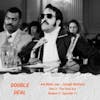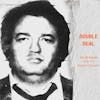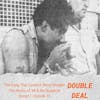
Edward "Teddy" Deegan - Part 1

Edward "Teddy" Deegan was murdered in Chelsea, Massachusetts on the evening of March 12, 1965. His murderers were never prosecuted. Instead, the FBI launched a decades-long coverup to protect his murderers, using one of them, Joe Barboza, as their primary witness to send 6 innocent men to prison for life.
Follow us on Twitter for sneak peeks of upcoming episodes. You can also find us on Instagram and Facebook.
Questions or comments, email lara@doubledealpodcast.com or nina@doubledealpodcast.com
Donate to Lara and Nina.
Thank you for listening!
All the best,
Lara & Nina
Lara:
Welcome back everyone! Today’s episode is part one of two. We’ll be talking about Teddy Deegan’s background, and the events leading up to his murder. Next week we’ll focus on the men who were arrested and convicted for his killing and the real perpetrators. Teddy died four years before I was born, but his brother Larry was a fixture in my home. No matter how many years passed, Larry was deeply wounded by his brother’s murder, visibly nervous and shaken by it. It always struck me as “implausible” that the government convicted the wrong men. The subject was brought up at least once during every gathering of the boys. I’d sit in the corner of our kitchen listening to them gripe about Joe Barboza, the Feds and the fate of the men who were railroaded. When I was in my teens, I told my father that those men must have been guilty of something. Not one to sugarcoat things, he looked at me and said, “who’s to say that someday, the government doesn’t decide what you’re doing is wrong?” Dad was referring to my political stance and outspoken nature which he always considered to be “dangerous.”
Larry passed away a decade and a half before the men convicted of Teddy’s murder were vindicated, but he went to his grave knowing who his brother’s assassins were. He didn’t need a congressional hearing to tell him that. Everyone knew, including the authorities, but they chose to keep the truth buried away for over three decades.
Nina:
That’s bad enough, but the fact that Joe Barboza and Jimmy Flemmi were allowed to roam the streets and continue to kill makes me sick. To add insult to injury, we learned recently that Stevie Flemmi, longtime FBI informant, was never convicted of at least one of the murders he was known to have committed. The 1969 murder of Peter J. Poulos still remains “unsolved” in Nevada. Is it because Nevada is still a death penalty state? Or because he committed the murder alone and had no one else to implicate? Stevie was also never tried for the Wheeler and Callahan murders in Oklahoma and Florida, respectively. Both of those states also have the death penalty. Flemmi testified against FBI Agent John Connolly regarding the murder of Callahan. Callahan was suspected of killing Wheeler. FBI Agent H. Paul Rico and Winter Hill Gang member Joe “Mac” McDonald were charged in Wheeler’s death. Both died in prison before the authorities could bring them to trial. Flemmi pleaded guilty to 10 murders in exchange for a life sentence and to get a sentence reduction for his brother Michael, a former Boston Police officer. Why would the government allow Stevie Flemmi to skate on those charges and what about justice for the Poulos family? Why were Flemmi and his fellow members of the Winter Hill gang allowed to skate on the other murders?
Lara:
I’m still convinced that at least three of those murders, Walter Bennett, Wimpy Bennett and Punchy McLaughlin weren’t carried out by Stevie Flemmi and Frank Salemme. We’ve voiced our opinions about those murders in previous episodes and will discuss our theories in future episodes.
Since we’ve covered Jimmy Flemmi and Joe Barboza we won’t be giving their backgrounds here. You can listen to episodes 19, 24, 25, and 27 to hear their stories.
Let’s move on to Teddy Deegan. In last week’s episode we mentioned that there was a chance that Teddy’s family connections played a part in Raymond Patriarca’s passive stance when Jimmy Flemmi and Joe Barboza asked Raymond for his blessing to kill Teddy. So Nina, tell us about Teddy’s family.
Nina:
Edward “Teddy” Deegan was born on January 2, 1930 in Boston, Massachusetts. He was the youngest child of Thomas Deegan and Margaret Sullivan. Margaret was born in St John, New Brunswick and Thomas was born in Somerville. Teddy’s older sister, Margaret, married Joseph Indelicato in 1935. Rumor has it that the Massachusetts Indelicatos were related to the Indelicatos in New York who were members of the Bonanno family. I have tried to make that link, but have so far been unsuccessful. If there is a connection it would be about two generations back, and I just haven’t been able to make it fit. However, I do believe that the story is true.
Lara:
I agree with you that Alphonse ‘Sonny Red” Indelicato and Joseph Indelicato were likely second cousins. Both families were from Agrigento, Sicily and Alphonse’s father Antonio immigrated to the US around the same time that Joseph’s father did. This distant connection has been rumored to be a possible reason as to why Teddy may have been killed. If you listened to last week's episode, you’ll remember that Raymond had entangled himself in the Bonanno Family drama.
Nina:
So who knows what kind of crazy story Raymond made up to justify his position regarding Teddy Deegan. Although I think we should say from the outset that it is very unclear if Raymond actually ok’d the Deegan murder. As we’ve discussed in the past several episodes, Jimmy Flemmi and Joe Barboza were murdering people and then going to Raymond and Jerry Angiulo afterward to gossip about it. We’ve found several instances where Jimmy would be on the wiretap talking about his victims. But he’d either be blaming someone else for the murder, or critiquing the hit, and saying it was “unnecessary”.
Lara:
Nowhere in the 302s from the wiretap did Raymond actually say “ok” to killing Teddy, but who knows what Jimmy may have told SA Rico after Teddy was already dead. Jimmy officially became a Top Echelon Informant the same day Teddy was killed. That in itself raises too many questions.
Nina:
As we’ve mentioned before, FBI SA Kehoe was taking reports from his own sources (specifically Vinnie Teresa) and the other FBI Confidential Informants and inserting them into his wiretap summaries without noting where the extra information was coming from.
With that being said, let’s talk about Teddy Deegan. Teddy was a longshoreman, and a boxer who fought under the name Vinnie DeGreco. His first pinch was at the age of 11, in 1941.
Lara:
In February 1948, Teddy and another boy stole about $200 worth of clothes from three downtown stores. Teddy got caught when he went to a tailor who was located in the West End with a stolen suit and asked him to reduce the pant size from a 39 to a 30. The tailor became suspicious and called the cops. Teddy’s underaged accomplice was charged with receiving stolen goods. Teddy should’ve known better than to bring those pants to his own neighborhood where everyone knew him.
Nina:
Most of Teddy’s arrests were for such minor offenses that they didn’t even make the papers.
He would ultimately be arrested 24 times in Boston and once in Needham. We won’t go through all of the arrests but just highlight a few.
He was pinched in August 1954 for a b&e in the nighttime. Followed by an assault arrest in October of ‘55 and a motor vehicle violation in May of ‘58. But Teddy was destined to cross paths with one of his childhood partners in crime, who would take him from an unknown, small-time hoodlum to the list of usual suspects that law enforcement kept: Romeo Martin, the “Home Run Hood”.
Lara:
Romeo Martin’s claim to fame was his 1951 escape from prison in Washington State. He hit a home run in the 7th inning of a prison all-star game. After he crossed first base, he just kept on running down the right field foul line and into the woods. The cops finally caught up with him back home in Boston four months later outside a college girls’ dorm in Roxbury. He had a ladder up to a second floor window and was about to climb up it.
Instead of getting sent back to Washington to serve the remainder of his 20 year term, Romeo was first sentenced to 5-7 years in State Prison for a series of housebreaks that he’d committed while he was on the lam. Probably with Teddy actually.
Nina:
Then in February 1953, Romeo tried to escape from Charlestown State Prison. But he was caught hiding under a pew in the prison chapel with a hacksaw in his pocket. His plan had been to saw his way out of the chapel and then drop over the wall onto the Prison Point Bridge. But unlike his homerun escape, Romeo wasn’t successful that time.
Romeo was paroled from Charlestown in January 1956, and immediately returned to Washington State to serve out the remainder of his sentence. He didn’t fight extradition because he wanted to get back to his baseball team, even though the cops told him he’d been replaced!
Lara:
By the summer of 1958, Romeo was paroled and back on the streets of Boston running with Teddy Deegan. In September, the two men were arrested ten minutes after they’d broken into a widow’s home in Needham when a neighbor lady called the cops on them. Police said they found jewelry, watches and rings that they thought had been stolen from other members of the community. The cops believed that Teddy and Romeo had been breaking into houses for about six weeks. They’d stolen thousands of dollars in cash and jewels in Reading, Wakefield, Stoneham, and Winchester.
According to his rap sheet, Teddy was held on bail at Dedham District Court on $5000 double surety. But it doesn’t appear that either of the two men did any time, even though Romeo was on parole from Washington.
The following month, Teddy was picked up again for a parole violation on an assault and battery charge. But it didn’t make the papers and he was once again free.
Nina:
At 2:50 on the afternoon of June 11, 1959 a bomb tore through the platform of the elevated train station in Boston’s North Station sending 38 people to the hospital, three of whom were listed in critical condition. The police announced they were searching for a former Somerville man they believed might be responsible for the bombing.
Six dry-cell batteries were found among the fragments of a group of shattered lockers. The batteries were covered with sulfide residue which indicated that they were part of the bomb, presumably used to activate the actual detonator. The device contained black powder and possibly some other explosive. But the authorities could not figure out what kind of detonator was used. The possibility was also advanced that the explosive might have been set off by a train entering the station. The experts pointed out that a timing fuse could have been attached by a wire string across the track, to be set off by a train passing over it.
Lara:
The authorities also believed that the bomb had been planted in the lockers sometime between twelve and two in the afternoon.
Its explosive force was similar to that of a 100 pound WW2 Air Force bomb. The blast shattered the big waiting room on the overhead platform between the inbound and outbound tracks of the Everett-Forest Hills rapid transit line which would later be known as the Orange Line.
The blast was so strong that it blew out a 14th floor window 200 feet away. Among the people present at the time were Teddy Deegan, Anthony Spinale and Salvatore Spinale. Anthony would later be in trouble with the law for bribing an official by giving him a TV set in an effort to reduce his brother Joseph’s prison sentence. Salvatore had recently been released from prison after receiving a sentence reduction for armed robbery in 1956. Earlier in 1952, Salvatore had been arrested along with Frank Imbruglia and Al Celeste, who I knew, for siphoning gas off of State sand trucks.
The perpetrators and reason for the bombing still remain a mystery, but considering who was there at the time of the bombing I suspect there was more to the story.
Nina:
Part of me thinks that they were just in the wrong place at the wrong time, but it’s still kind of suspicious.
A little over two weeks later, Teddy was sentenced to 6 months in the Dedham House of Correction for breaking and entering and larceny in the daytime. Then on October 16, 1963 he was charged with breaking and entering in Brookline and a week later he was picked up for an armed robbery in Boston.
Nothing ever came of those cases, but as we’ve seen in previous stories, more than a few of these men would have been better off staying in jail. In 1964 Teddy had more to worry about than just the cops.
Lara:
On July 25, 1964 the Everett home of Carmen Puopolo was robbed. Puopolo was a local bookmaker who told the police that the burglars took $1000 in small bills, a pistol and assorted jewelry valued at $3000 to $3500. Word on the street was that the thieves got closer to $80,000, and that the men who pulled it off were Harrold Hannon, Wilfred Delaney, Teddy Deegan and Anthony Sacramone thanks to Jimmy Flemmi’s rumor mill. But it is far more plausible that Jimmy, Barboza and Sacramone robbed Puopolo. Knowing they would have problems with Jerry Angiulo when he found out, they spread the rumor that it was Teddy, Delaney and Hannon adding Sacramone into the story after the fact as a cover for Jimmy killing him.
We discussed the murders of Hannon and Delaney which occured 10 days after the Puopolo robbery in episode 25. The list of men who claimed to have killed Hannon and Delaney isn’t a short one. Previously we talked about the theory that Buddy McLean and Joe McDonald killed them in order to obtain the location where Punchy McLaughlin was hiding. Barboza would later testify in front of a Grand Jury that Wimpy Bennett, Jimmy and Stevie Flemmi were the ones who tortured and killed Hannon and Delaney in an effort to find out where the money from the Puopolo robbery was.
Nina:
Well, you know that I think that Hannon and Delaney were killed because they were trying to help Georgie McLaughlin turn himself in to the authorities, and go behind the FBI’s backs to do it. Jerry Angiulo had been gossiping about it at Raymond’s and he was probably on the wiretap at his place gossiping about it too. To add to the mess, Jerry was calling up Jimmy Flemmi and gossiping to him specifically about different things going on in Boston. So I tend to believe that it was Joe Barboza and Jimmy Flemmi who killed Hannon and Delaney.
Lara:
As for Sacramone’s murder, there is no question in my mind that it was Jimmy, and even the FBI initially reported that it was Jimmy. It was only after Jimmy went to his FBI handler Rico to tell the lie that Teddy was the killer that the Feds started saying it was Teddy. Add to that Jimmy and Barboza’s trip to Raymond’s and the lie took root. Anthony Stathopoulos’ later statements didn’t help dispel the myth.
Nina:
Anthony Stathopoulos later told the authorities that sometime in late August 1964 Jimmy Flemmi had met with him, Deegan, and another man at a restaurant to discuss the “arrangement to silence” Anthony Sacramone because Sacramone was too talkative about the Populo theft. Stathopoulos' claim that Teddy was with him and Jimmy makes no sense, but considering Stathopoulos was in fear of his life when he made that statement to the authorities, it’s understandable. Shortly after that meeting, Flemmi was shot and unable to complete the job.
Jimmy Flemmi had murdered his wife’s lover, Iggy Lowry, in a fit of rage in late August. In revenge, Maureen tried to shoot Jimmy, but only got him in the leg. Jimmy was hospitalized and had to make up some elaborate story about how he’d been chased through the streets and shot at. But the leg wound didn’t keep Jimmy off the street for long, because he murdered Carlton Eaton just a few weeks later, and then attacked a guy with acid about ten days before he killed Sacramone. So Tony Stats’ story that Jimmy couldn’t have killed Sacramone six weeks after Jimmy was shot at doesn’t make any sense.
Lara:
I doubt that Teddy would have agreed to sit down with Jimmy, but that’s Stathopoulos’ version of events. More than a few of Stathopoulos’ stories don’t quite add up. We’ll talk more about that a little later and in the next episode.
Nina:
For those of our listeners who didn't catch Episode 25, I’ll give a brief summary of Anthony Sacramone’s murder:
Sacramone was murdered in Everett in the early morning hours of October 17, 1964. He was stabbed four times in his head and neck before being shot twice in the back of the head. The Everett police said, “Whoever murdered Sacramone first tried to stab him to death, then went berserk and shot him when the knife failed to kill.”
Everything about that description says Jimmy Flemmi murdered Sacramone. But as Lara mentioned before, the Feds were covering for Jimmy and told the Everett police that Teddy Deegan had committed the murder. They claimed that Teddy and Sacramone were in the car doing drugs, and Teddy lost control and attacked Sacramone.
Lara:
I’ve already said in several episodes: Teddy was not a killer. He was a thief doing mostly B&Es, and likely didn’t start carrying a gun until he realized Jimmy and Barboza had it in for him. Sacramone was high on everything but the kitchen sink and paranoid Jimmy couldn’t trust him not to talk about the Puopolo home invasion. The way Sacramone was killed was classic Jimmy.
Nina:
Let’s back up a little bit. On September 15, 1964, during a meeting at Raymond Patriarca’s, Peter Limone stated that sometime in mid-to-late August, he had provided Teddy Deegan with two guns from Ronnie Cassesso. Approximately a week after that, Teddy called Limone to tell him that the guns were inoperable, and Limone told Teddy to get rid of the guns. (34.38)
We haven’t really talked too much about Peter Limone yet, so I’ll just give a brief background here. Peter Limone was Jerry Angiulo’s right hand man, and sometimes bodyguard. He’d been born on May 7, 1934 in Boston’s West End. His father was also named Peter and his mother was Antonina Lombardo. They’d both come from Augusta, Syracuse, Sicily. Like Jerry, Limone did not have an extensive record. In fact he didn't really make the papers until 1963 when the Feds really started cracking down on the mafia. In December 1964, the Boston Globe reported that he’d been arrested three times, for “being concerned with a lottery, breaking and entering, and receiving stolen goods.”
Lara:
We’ll get more into Limone’s story in the next episode.
In the meantime on October 5, 1964 SA Rico sent a memo to the Boston SAC regarding Jimmy Flemmi. Another informant whose number is redacted, stated that he is very friendly with Jimmy, but Jimmy is extremely dangerous, and he believed that he had committed multiple murders.
On October 18th, SA Rico submitted another memorandum to the Boston SAC advising that Jimmy Flemmi informed him that day that Teddy owed Jimmy’s brother Stevie Flemmi money and that Stevie told him to “get the money up.” Jimmy told Rico that Teddy hadn’t come up with the money and Stevie wanted to kill Teddy and wanted him, Jimmy, to accompany him on the hit.
Nina:
Did I mention that the man was a pathological liar?
Lara:
Which one, Rico or Jimmy?
Nina:
Both of them, but I was referring to Jimmy that time.
That same day Rico sent a memo to the Boston SAC stating that it was his opinion that Jimmy Flemmi was going to kill Teddy. This was four months after the Boston SAC sent a memorandum to J Edgar Hoover listing out the murders that Jimmy Flemmi had committed so far. In that memo, SA Dennis Condon noted, “Flemmi said all he wants to do is kill people now, and it’s better than hitting banks.”
On October 23rd, a memorandum was sent to the Boston SAC stating that Peter Limone told Patriarca that Jimmy Flemmi was difficult to control. Limone recalled that Jimmy had shown up at the West End Veterans Club and Limone asked him to leave because of the heat Jimmy had on him. Jimmy denied there was any heat on him and proceeded to inquire about Teddy Deegan. Jimmy left and Limone called Teddy right away. Limone informed Teddy that Jimmy said he owed him $300 and that was the reason he was looking for him. It was Limone’s opinion that Jimmy was out to kill Teddy.
Lara:
On December 1, 1964, the wiretap at Raymond’s picked up Jerry Angiulo telling Raymond that Teddy Deegan and another unnamed individual had recently contacted him. They were trying to arrange a meeting between Spike O’Toole and Jerry. But Jerry told Teddy that he didn’t want to meet Spike in person. However, he was willing to talk on the phone (34.68). They came up with some elaborate scheme to make that happen, but it doesn’t seem like it did. Likely because Spike’s personal life was such a mess. He’d gotten a death threat just before being released from jail, and was in hiding with Georgie McLaughlin. Then in January, Dorothy Barchard had brought a suit against him for the care of their two toddler daughters, and Spike was picked up on morals charges. The following month, Spike was arrested along with Georgie where they’d been hiding out in Dorchester. Dorothy Barchard was likely the one who tipped the authorities off as Spike had taken up with a new woman. Spike was finally released in mid-March, after Teddy was killed. He again approached Jerry and Jerry finally agreed to meet with him.
Nina:
On January 4, 1965 Edward "Wimpy" Bennett and Jimmy Flemmi contacted Patriarca through Ronnie Cassesso. Supposedly Wimpy and Jimmy got the word that Patriarca wanted something from them, so they reached out to Ronnie to make the entree.
When they were gossiping about the conversation later, Raymond said that he thought that Jimmy Flemmi was half Irish, but Angiulo insisted he knew Jimmy’s family and stated that both his parents were Italian.
Lara:
Seriously! Another liar.
Wimpy Bennett was feeling out Patriarca as to whether or not he could affect a peace deal in the gang war between the McLean crew and the McLaughlins.
I have to throw out one of my favorite Raymondisms here: If they don’t straighten themselves out, I’m gonna have to go down there and declare martial law!
Nina:
How’d that work out?
Jerry told Raymond that Wimpy reached out to him before Wimpy went to Raymond because Wimpy was concerned with the gangland slayings, and was disgusted with the situation and had no idea what to do about it. Wimpy told him that hoodlums were coming in from NY, and he didn't know who was going to be killed next or what side to take in the argument.
Jerry told Wimpy that he had to choose a side and stick with his decision.
Lara:
Wimpy flip flopped more than the White Castle burgers he liked to eat.
Jerry told Limone that someone told him, "don't worry about Punchy McLaughlin.” Meaning Punchy was going to be killed.
He went on to tell Limone that before Harold Hannon was killed, Hannon had stated that Jimmy Flemmi was crazy and was going to get everyone killed.
On January 28, 1965 Teddy and Stathopoulos were arrested for a shooting incident that occured in Chelsea. They were suspected of firing at a couple, but both were released on bail.
Nina:
Between March 5th and 8th of 1965 several reports were written by the agents of the Boston FBI field office regarding the potential hit on Teddy Deegan.
On March 5, 1965, Jerry told Patriarca that Jimmy Flemmi was with Joe Barboza when Barboza had killed Joseph Francione in Revere, Mass. in January. It appeared that Frank Smith, Boston hoodlum, had ordered the “hit”. Patriarca again became enraged that Smith had the audacity to order a “hit” without Raymond’s knowledge. But I believe that Jimmy and Barboza were using Frank Smith as a scapegoat. We’ll be doing an episode on Frank Smith in a few weeks. We’re titling it “Nazis in Maine”.
Patriarca told Jerry that he explained to Jimmy that he was to tell Smith that no more killings were to take place unless he, Patriarca, cleared him. Jerry stated that he also had a talk with Jimmy. He pointed out that Patriarca has a high regard for Jimmy but that he, Patriarca, thought that Jimmy didn’t use enough common sense when it came to killing people. Jerry gave Jimmy a lecture on killing people, pointing out that he shouldn’t kill people because he had an argument with them at any time. If an argument did ensue, he should leave and get word to Patriarca who, in turn, would either “OK” or deny the “hit” on this individual, depending on the circumstances.
Lara:
A lot of good that lecture did!
Jimmy told Jerry that “Wimpy” Bennett had an extremely high regard for both Angiulo and Patriarca and that Wimpy would do anything for the two of them. Jerry pointed out that Bennett had been with them a long time and that he was glad to hear Bennett’s sentiments.
According to Patriarca, another reason that Jimmy came to Providence to contact him was to get the “OK” to kill Eddie Deegan of Boston who was with the McLaughlins. As in every other 209 and 302 it wasn’t clear if Jimmy received permission to kill Teddy. The story that Jimmy told Jerry concerning Teddy’s role in Sacramone’s death was contradictory to the one he had told to SA Rico and Patriarca.
Nina:
Because the man was a psychopath and a pathological liar. But the FBI was still using him as a source!
Lara:
And he was high all of the time!
Nina:
Well that too!
On March 9th Jimmy and Barboza made a direct request to Raymond again for permission to kill Teddy. There was no report from the wiretap as to whether or not Patriarca provided his consent on March 9th, but there was a note in the Congressional hearing documents that Raymond did consent.
But Lara and I both read the handwritten transcripts multiple times and there was no mention of Raymond giving his ok. In a handwritten transcript dated March 9th at 12:28 PM Jimmy and Barboza arrived at Raymond’s office. They both told Raymond that they had a problem with Teddy. Jimmy continued to complain about the murder of Anthony Sacramone just as he had during his October visit the day after Sacramone was killed, but this time adding that Sacramone had been in the can for bank robbery and was tight with Bobby Donati.
According to Jimmy, Teddy was looking for an excuse to whack Donati. Barboza claimed that earlier that month Teddy and four other guys were in a bar when Donati showed up. Teddy and his buddies cursed at Donati, so he left. But later that night around 3am a woman came around, knocking on Donati’s door. He looked out of the window and saw 4 or 5 guys in a car and refused to answer her. Jimmy then offered up that Donati had lent Sacramone $600, and Teddy wanted the money so he killed Sacramone.
Lara:
Handwritten notes from SA Kehoe who was monitoring the conversation between Flemmi, Barboza and Patriarca indicated that Flemmi's motive for killing Deegan was tied to the McLean-McLaughlin gang war. Yet another motive to add to the list. On March 10th, SA Rico noted in a memorandum to Hoover that an informant told him that Jimmy Flemmi was telling people to put the word out that Patriarca had given his permission to take out Teddy. The following day Hoover was informed that Jimmy and Barboza had traveled to Providence, RI and had indeed obtained permission to kill Teddy and a “dry run” had already been carried out. And the Feds did nothing to stop it!
I also want to add that the identity of the informant was withheld from Congress and is still redacted to this day. Of course, I think it was Frankie Salemme.
Nina:
Let’s backtrack here. According to the State Police in late February they received a report that Teddy Deegan showed up at the Ebb Tide and pulled a gun on Barboza forcing him to back down. I would suspect that Barboza’s embarrassment from that incident accelerated his and Jimmy’s desire to take out Teddy.
Lara:
No question about that!
On the evening of March 12, 1965 Wilfred “Roy” French received a phone call at the Ebb Tide.
According to Frank Imbruglia’s testimony Ronnie Cassesso, Jimmy Flemmi, Romeo Martin, Nicky Femia and Freddy Chiampa left the bar shortly after that. According to waitress Roberta Grimes’ statement Barboza, Frank Imruglia, Ronnie Casseso, Romeo Martin, Joseph Salvati, Roy French, Nicky Femia and Freddie Chiampa were indeed all in the Ebb Tide around the time of the call. Teddy was supposedly the one who called Roy French as they were planning to participate in a B&E in Chelsea that French had set up.
Anthony Stathopoulos drove Teddy to Chelsea where he waited in the car. According to Stathopoulos' later statement, when he heard the gunshots he thought the police were shooting at Teddy and Roy French in an effort to arrest them, so he took off.
Nina:
But the truth was that Tony Stats saw Jimmy and Barboza heading for his car and he knew he was going to be killed as he actually heard them yell, “get him too!” Stathopoulos immediately drove away and went to the home of attorney Al Farese. Farese called the Chelsea Police Department believing he would be heading there to bail out French and Teddy, but they didn’t have them in custody. They went to the location that Stats said he left Teddy and French. There they found Teddy lying in the street face down in a doorway near 4th St. and Broadway in Chelsea. He had been shot 5 times, twice in the back of the head and three times in the front. Police found several copper jacketed slugs near his body.
Lara:
The police requested Farese and Stats return to the police station in the morning. But when they did they had good old defense atty. John Fitzgerald with them. Fitzgerald told the police that he had received a call from Teddy the evening prior at 8:15 pm. The police asked Fitzgerald why Teddy would be calling him. Fitzgerald said that Teddy called him every evening to let him know that he was ok. To add to the twists and turns, Fitzgerald had bailed Roy French out of jail earlier that morning as French had been arrested for a brawl in the Ebb Tide over a girl shortly after midnight.
Nina:
French must have thought that would be the perfect alibi. But little did he know his partners in crime were anything but partners.
Listen in next week for part two. Many of you know how this story ends, but we’ll be taking you through the investigation and coverup and how the government's web of secrets began to unravel. Thanks for listening! Share an episode with your friends!
Lara and Nina:
BYE!!!!
Featured Episode
Season 2 is finally here!


































